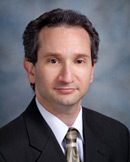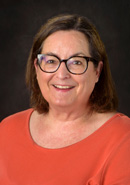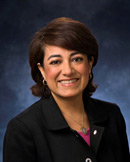Our Physicians
 |
Murali Chintagumpala, MD, is a clinical co-director of the Retinoblastoma Center of Houston. He is a pediatric oncologist at Texas Children’s Cancer Center and professor of pediatrics at Baylor College of Medicine. At Texas Children’s Cancer Center, he is clinical director of neuro-oncology. At the national level, he serves as chair of the Retinoblastoma Committee within the Children’s Oncology Group, and is a leader in conducting clinical trials involving children with retinoblastoma. |
 |
Dan Gombos, MD, is a clinical co-director for the Retinoblastoma Center of Houston. While serving as the ocular oncologist for the Children’s Cancer Hospital at The University of Texas M. D. Anderson Cancer Center, Gombos will also oversee the surgical needs of all retinoblastoma patients through the Retinoblastoma Center of Houston. |
 |
Cynthia E. Herzog, MD is a Clinical Co-Director of the Retinoblastoma Center of Houston. She is a pediatric oncologist at the University of Texas M.D. Anderson Cancer Center and serves as Deputy Division Head and Professor for the Department of Pediatrics at The Children’s Cancer Hospital. |
 |
Patricia Chevez-Barrios, MD is research co-director of the Retinoblastoma Center of Houston. An ophthalmic pathologist, she conducts basic and translational research at Houston Methodist Hospital Research Institute. Chevez-Barrios will conduct all tumor biopsies and diagnostic analyses for the center, will direct the tumor bank for the center and, with other research co-directors, will lead research at the Retinoblastoma Center of Houston. |
 |
Richard L. Hurwitz, MD is a research co-director of the Retinoblastoma Center of Houston. He is a member of the Texas Children’s Cancer Center and associate professor in Baylor College of Medicine’s departments of pediatrics, ophthalmology, molecular and cellular biology and the Center for Cell and Gene Therapy. He directs translational research at Texas Children's and is lead investigator in gene therapy clinical trials for retinoblastoma and ocular disorders. |
 |
Frank Y. Lin, MD is a member of the Retinoblastoma Center of Houston. He is a pediatric oncologist at Texas Children’s Cancer Center and Assistant Professor, Department of Pediatrics, Section of Hematology/Oncology at Baylor College of Medicine |




What causes retinoblastoma?
- This disease results from specific genetic defects in one of the chromosomes in the cell.
- Approximately 30 to 40 percent of retinoblastoma cases are hereditary.
- Genetic counseling can help families understand the risk of retinoblastoma. It is especially important when more than one family member has had the disease or if the retinoblastoma occurs in both eyes.
- A child should be monitored from birth if one parent had retinoblastoma. The parent may have passed on the genetic mutation to the child.
- Any child can get retinoblastoma regardless of their sex, age or ethnic background.
